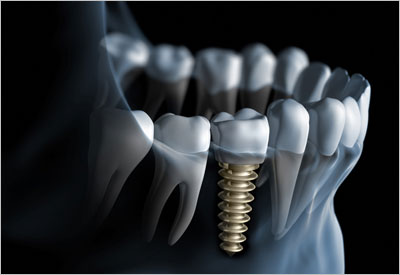 Dental implants represent an exciting advance in dental technology for tooth replacement treatment. In the past, patients had to settle for options like bridges and dentures, which fill in the empty spaces in the smile but do nothing more to replicate the rest of the tooth structure.
Dental implants represent an exciting advance in dental technology for tooth replacement treatment. In the past, patients had to settle for options like bridges and dentures, which fill in the empty spaces in the smile but do nothing more to replicate the rest of the tooth structure.
Now, patients can turn to dental implants for a complete replacement tooth, including an artificial tooth root as well as a prosthetic crown.
In the mid-twentieth century, Swedish researchers discovered that titanium was biocompatible with bone, giving it the capacity for osseointegration, or fusing with the bone. This characteristic provided the foundation of dental implant technology.
Essentially, the implant acts as an artificial tooth root. It is a titanium post that is topped with an abutment that secures the prosthetic crown.
Dental implants can be useful in treating tooth loss in a variety of scenarios.
In acting as a replacement root, the dental implant has many advantages over other tooth replacement options. Implants help to stabilize the jawbone and prevent the bone loss that occurs when a tooth’s root is lost. Implants also are more effective at chewing and easier to maintain than bridges and dentures.
Dental implants can be useful in treating tooth loss in a variety of scenarios. Implants can support a single tooth replacement or a bridge. Dental implants can even be used to support an entire denture, which appeals to patients who are concerned about slip-ups and an appliance’s decreasing fit over time.
 The devices are placed in an outpatient procedure, with minimal disruption to the patient’s routine. Many patients are even able to enjoy a light meal of soft foods the evening of the appointment. Over the next several months following placement, the implant fuses with the jaw.
The devices are placed in an outpatient procedure, with minimal disruption to the patient’s routine. Many patients are even able to enjoy a light meal of soft foods the evening of the appointment. Over the next several months following placement, the implant fuses with the jaw.
Patients with tooth loss should consider the advantages of dental implants when deciding among their treatment options. Ask your dentist if dental implants would be appropriate in your case.
